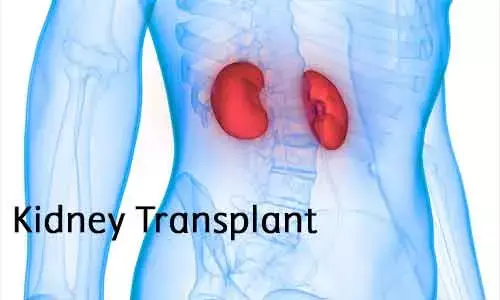- Home
- Medical news & Guidelines
- Anesthesiology
- Cardiology and CTVS
- Critical Care
- Dentistry
- Dermatology
- Diabetes and Endocrinology
- ENT
- Gastroenterology
- Medicine
- Nephrology
- Neurology
- Obstretics-Gynaecology
- Oncology
- Ophthalmology
- Orthopaedics
- Pediatrics-Neonatology
- Psychiatry
- Pulmonology
- Radiology
- Surgery
- Urology
- Laboratory Medicine
- Diet
- Nursing
- Paramedical
- Physiotherapy
- Health news
- Fact Check
- Bone Health Fact Check
- Brain Health Fact Check
- Cancer Related Fact Check
- Child Care Fact Check
- Dental and oral health fact check
- Diabetes and metabolic health fact check
- Diet and Nutrition Fact Check
- Eye and ENT Care Fact Check
- Fitness fact check
- Gut health fact check
- Heart health fact check
- Kidney health fact check
- Medical education fact check
- Men's health fact check
- Respiratory fact check
- Skin and hair care fact check
- Vaccine and Immunization fact check
- Women's health fact check
- AYUSH
- State News
- Andaman and Nicobar Islands
- Andhra Pradesh
- Arunachal Pradesh
- Assam
- Bihar
- Chandigarh
- Chattisgarh
- Dadra and Nagar Haveli
- Daman and Diu
- Delhi
- Goa
- Gujarat
- Haryana
- Himachal Pradesh
- Jammu & Kashmir
- Jharkhand
- Karnataka
- Kerala
- Ladakh
- Lakshadweep
- Madhya Pradesh
- Maharashtra
- Manipur
- Meghalaya
- Mizoram
- Nagaland
- Odisha
- Puducherry
- Punjab
- Rajasthan
- Sikkim
- Tamil Nadu
- Telangana
- Tripura
- Uttar Pradesh
- Uttrakhand
- West Bengal
- Medical Education
- Industry
Long term Corticosteroids not necessary after kidney transplant: JAMA Surgery

USA: Long-term corticosteroids are not necessarily required after a kidney transplant, reveals a recent study in the journal JAMA Surgery. According to the study, corticosteroids need not be a necessary part of calcineurin-based multiple drug immunosuppressive regimen in recipients of kidney transplant.
There was no increased risk of allograft failure in such patients who discontinued the corticosteroid treatment.
People who undergo kidney transplantation receive immunosuppressive drug treatment that typically consist of calcineurin inhibitor (such as mycophenolic acid or azathioprine, cyclosporine or tacrolimus) and corticosteroids in order to prevent rejection. Corticosteroids use is associated with a number of complications that makes these drugs undesirable to be included in immunosuppressive drug regime. However, cessation of corticosteroids is associated with a higher risk of short-term rejection. Long-term outcomes of patients withdrawn from corticosteroids remain uncertain.
Against the above mentioned background, E. Steve Woodle, University of Cincinnati, Cincinnati, Ohio, and colleagues aimed to compare long-term kidney transplant outcomes of patients randomized to continue or withdraw corticosteroids.
For the purpose, the researchers conducted prospective multicenter randomized double-blind placebo-controlled trial between November 1999 and December 2002. This was linked to a mandatory national registry with validated outcome ascertainment until June 8, 2018. The study included 28 kidney transplant centers in the United States, including 386 low– to moderate–immune risk adult recipients of a living or deceased donor kidney transplant without delayed graft function or short-term rejection in the first week after transplant.
Of the 385 included patients, 191 received tacrolimus and mycophenolate mofetil without corticosteroids and 194 patients received tacrolimus and mycophenolate mofetil with corticosteroid, 7 days after transplant. They were followed for a median of 15.8 years after transplant.
Primary outcome was kidney allograft failure from any cause including death and allograft failure censored for patient death defined by the requirement for long-term dialysis or repeat transplant.
Key findings of the study include:
- The adjusted hazard ratios of allograft failure from any cause including death was 0.83 and for allograft failure censored for patient death was 0.78 and did not differ between the patients assigned to withdraw from corticosteroids vs assigned to continued corticosteroids.
- Results were consistent in a per-protocol analysis among 223 patients who continued the trial-assigned treatment of corticosteroid withdrawal (n = 114) or corticosteroids (n = 109) through at least 5 years after transplant.
- The outcomes of trial participants in either treatment group did not differ from similarly treated contemporary registry patients who met trial eligibility criteria and were treated with the same immunosuppressive drugs.
"Long-term corticosteroids may not be necessary as part of a calcineurin-based multiple drug immunosuppressive regimen in low– to moderate–immune risk kidney transplant recipients," concluded the authors.
The study titled, "Early Corticosteroid Cessation vs Long-term Corticosteroid Therapy in Kidney Transplant Recipients: Long-term Outcomes of a Randomized Clinical Trial," is published in the journal JAMA Surgery.
Dr Kamal Kant Kohli-MBBS, DTCD- a chest specialist with more than 30 years of practice and a flair for writing clinical articles, Dr Kamal Kant Kohli joined Medical Dialogues as a Chief Editor of Medical News. Besides writing articles, as an editor, he proofreads and verifies all the medical content published on Medical Dialogues including those coming from journals, studies,medical conferences,guidelines etc. Email: drkohli@medicaldialogues.in. Contact no. 011-43720751


